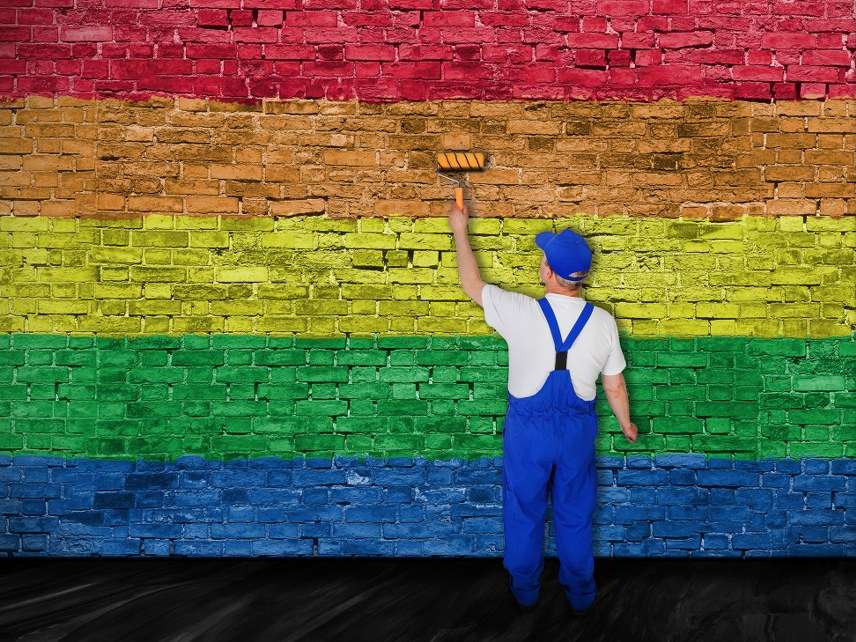Congressional Democrats Reintroduce LGBT-Protecting Equality Act
But is it actually even needed?

Congressional Democrats are again attempting to amend federal civil rights laws to include protections for sexual orientation and gender identity with the reintroduction of the Equality Act.
The Equality Act would add the words "sexual orientation" and "gender identity" to the list of classes protected under federal law from discrimination in the Civil Rights Act of 1964. This means it would be against federal law to discriminate in employment, public accommodations, housing, education, bank practices, jury service, and similar areas on the basis of somebody being gay or transgender.
There's more to the bill than that, but the antidiscrimination provisions are going to get the bulk of the oxygen.
The Equality Act dramatically expands what the federal government counts as a "public accommodation" under the Civil Rights Act. When the Civil Rights Act was passed, it specifically limited the definition to areas where African Americans were being denied service in wide and broad patterns—hotels, gas stations, movie theaters, and the like. The law was narrowly tailored. The Equality Act dramatically expands this definition of "public accommodation" to cover any business in the country that provides a "good, service, or program."
That matters, as far as this whole tiresome wedding cake fight goes, because under the current federal definition of public accommodations, services like photographers and florists do not qualify. So even if sexual orientation were added, for example, the federal government still couldn't force a photographer to shoot a gay couple's wedding.
And while the Equality Act doesn't alter the exceptions in the Civil Rights Act for religious organizations, it specifically notes that the Religious Freedom Restoration Act of 1993 cannot be invoked as a defense for discriminating under these laws. The American Civil Liberties Union sees this as a selling point.
Every single one of the 500 estimated Democratic candidates for president are going to line up behind this legislation. There have been a handful of Republican lawmakers who have declared support for it as well, but so far, NBC notes, Sen. Susan Collins of Maine is the only Republican on board. With Republicans in control of the Senate, the Equality Act seems unlikely to get much of anywhere.
It's possible that introducing this bill again (it was introduced in 2015 and 2017 without much luck) is not about changing the law so much as getting Republicans on record about LGBT issues in advance of a heated general election. And if that is indeed the case, it is its own kind of progress: Less than 20 years ago, Republicans were using LGBT topics as a wedge issue against Democratic leaders, and Democrats were trying to thread a centrist needle.
It's also worth reminding people that we used to have a bill known as the Employment Non-Discrimination Act (ENDA), a much less sweeping proposal than the Equality Act. For years, Democratic lawmakers tried (and failed) to pass the bill through both houses. While they were doing that, the culture continued to change in such a way that more and more citizens and businesses voluntarily adopted the practices mandated by ENDA: That employers shouldn't discriminate on the basis of sexual orientation or gender identity. Were it introduced today, ENDA very well could be passable. But it was switched out and replaced with the much further-reaching Equality Act, which serves as both a reminder that free exchange is a more powerful cultural force than fiat, and that Congress is always either two steps behind or overreaching.
The Equality Act has the feel of a get-out-the-vote effort aimed at LGBT voters. The campaign for the bill is heavily focused on how many people are technically "unprotected" because not every state covers sexual orientation or gender identity in its own antidiscrimination laws. But saying that 8.1 million people are "unprotected" from antidiscrimination laws (as The Williams Institute does here) is a far cry from saying that 8.1 million people are facing actual discrimination. Framing the number that way is intended to frighten LGBT people.
While such discrimination does still happen, it's abundantly clear that America's cultural attitude on LGBT issues has shifted in the direction of tolerance and inclusion. As a society, Americans now find those examples of employment discrimination shocking and pretty gross. We use cultural pressure to attempt to change these practices, and often it works.
That then leaves some deep concerns with why the bill so dramatically expands what counts as a public accommodation. Broadening the definition in the way this bill does will spur litigation against small businesses and employers, but it won't fix a problem that's getting better by the day.
Read the bill for yourself here.

Show Comments (105)